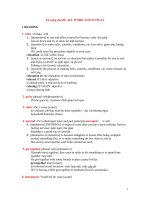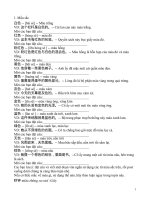Toeic theo chủ đề 10 pdf
Bạn đang xem bản rút gọn của tài liệu. Xem và tải ngay bản đầy đủ của tài liệu tại đây (72.34 KB, 6 trang )
LISTENING 37
Question: An instructor describes the formation and effects
of acid rain. Match each term with its definition.
[Click on a sentence. Then click on the space where it
belongs. Use each sentence only once.]
precipitation fossil fuel pollutant
something that contaminates the environment
condensed vapor that falls to earth as a deposit like rain or snow
a fuel formed in the earth from plant or animal remains
Answer:
precipitation fossil fuel pollutant
condensed vapor a fuel formed in something that
that falls to earth the earth from contaminates the
as a deposit like plant or animal environment
rain or snow remains
WHAT’S UP WITH IDIOMATIC EXPRESSIONS
You probably won’t see the greeting “What’s up?” in the reading
portion of the TOEFL exam, but you might hear it—or another
idiom—on the listening test. Idioms are words or phrases used
in a particular region. Idiomatic expressions often have unusual
grammatical structures or have a meaning that does not make sense
when you add up the meanings of each word. Here’s an example
of a test question that will ask you to identify the meaning of an
idiomatic expression:
Woman: The astronomy midterm is tomorrow!
Man: I know. I’m not ready. It’s going to be an all-nighter!
38 TOEFL EXAM ESSENTIALS
Question: What does the man mean?
a. He’s going out past midnight.
b. He thinks the midterm is at night.
c. He’s going to stay up late studying.
d. He’s not going to study—it’s too late.
The correct answer is c. If you don’t know an idiomatic
expression, think about what makes sense in the situation. You
can eliminate choices a, b, and d because they are not what is sug-
gested in the context of the conversation.
Keep Your Ears Open for Idioms
“Keep your ears open”means to stay attuned—so keep your
ears open for idiomatic expressions while you are listening to
everyday conversations. Here is a sample of some idioms
used in North America:
all of a sudden: suddenly
All of a sudden, the dog ran into the road.
boil down: summarize; amount
He boiled down the report to a page and a half.
The report boiled down to a plea for more funding.
catch up: to complete something belatedly
I need to catch up on my sleep.
drop off: deposit or deliver
She dropped off the package at his house.
find out: discover, learn
I don’t know the answer, but I’ll find out for you.
LISTENING 39
get down: give one’s attention to; depress
Let’s get down to business.
The rain was getting her down.
have on: wear
The man has on a new sweater.
keep + –ing verb: continue without interruption
She kept talking throughout class despite the teacher’s
warnings.
jump in: begin or enter eagerly
The woman didn’t wait for instructions, she just jumped
right in.
make up your mind: settle, decide
I made up my mind to take the earlier train.
put off: to hold back to a later time
You will have to put off buying that dress until you have
more money.
show up: arrive, appear
He always late—he would show up late to his own funeral!
sleep on it: delay making a decision until the next day
After considering the plan, the council decided to sleep on
it and cast a vote the next day.
take place: happen, occur
U.S. presidential elections take place every four years.
used to + verb: something accomplished in the past, but
not in the present
She used to work as an investment banker, but now she’s a
teacher.
40 TOEFL EXAM ESSENTIALS
QUICK QUIZ
Ask someone who speaks fluent English to read the following pas-
sages, questions, and answer choices into a tape recorder. Your
reader should speak at a normal, conversational pace. If you can’t
find someone to help you, read aloud to yourself and answer the
questions that follow. The answers can be found on page 48.
Woman 1: Are going to the party tonight?
Woman 2: I don’t think so. It’s been a long day. I’m beat!
1. Why isn’t Woman 2 going to the party?
a. She doesn’t like parties.
b. She’s too busy to go.
c. She’s too tired to go.
d. She’d rather stay home and beat eggs.
Man: I promised Dante that I’d lend him my car, but I for-
got that I need it today to get to work.
Woman: I have his cell phone number.
2. What will the man probably do?
a. call his mother
b. call Dante on his cell phone
c. use the cell phone to call his boss at work
d. skip work today
Woman: I didn’t like that novel.
Man: Neither did I.
3. What does the man mean?
a. He didn’t like the book either.
b. He doesn’t like reading novels.
LISTENING 41
c. He did like the book.
d. He doesn’t know what to do.
Man: Would you mind if I turned off the radio?
Woman: Well, I’m in the middle of listening to the game.
It’s almost over.
4. What is the woman implying?
a. The man should listen to the game too.
b. The man doesn’t like sports.
c. She’ll turn off the radio right away.
d. She’ll turn off the radio when the game is finished.
Man: So, how’d you do in your acting class?
Woman: Let’s just say that I won’t be winning any Acad-
emy Awards.
5. What does the woman mean?
a. She’s a terrific actress.
b. She thinks she didn’t do very well in acting class.
c. She didn’t go to class.
d. She doesn’t have time to watch the Academy Awards
ceremony on TV.
Woman: Hey, why aren’t you at the physics lab?
Man: I don’t have lab on Tuesdays.
Woman: Today’s not Tuesday—it’s Wednesday! Really, I
think you would forget your head if it weren’t
attached to your shoulders.
Man: Oh no!
Woman: You can just make it if you take my car.
Man: Thanks, I’ll be careful with it!
42 TOEFL EXAM ESSENTIALS
6. What does the woman mean by “you would forget your
head if it weren’t attached to your shoulders”?
a. The man is very forgetful.
b. The man forgot where the physics lab was.
c. The man has had neck surgery.
d. The man usually doesn’t forget things.
7. What will the man probably do?
a. skip lab and go to lunch with the woman
b. run as fast as he can to the lab
c. call his professor and explain the problem
d. borrow the woman’s car and drive to the lab
Questions 8 through 11 are based on the following class
discussion:
Professor: By now you have read the chapter about the challenges
faced by Native Americans after the first Europeans set-
tled in North America. What were your reactions?
Yes, Malinda?
Malinda: I was really surprised that the biggest threat to the
Native Americans was disease. I couldn’t believe how
much damage smallpox and measles caused.
Jose: Yeah, it was really devastating. The native population
just didn’t have the immunity to those diseases. I read
in the chapter that smallpox and measles killed entire
Native American communities before even one Euro-
pean got sick!
Barbara: Disease wasn’t the only problem. There was genocide.
And European settlement also destroyed their tradi-
tional way of life.









